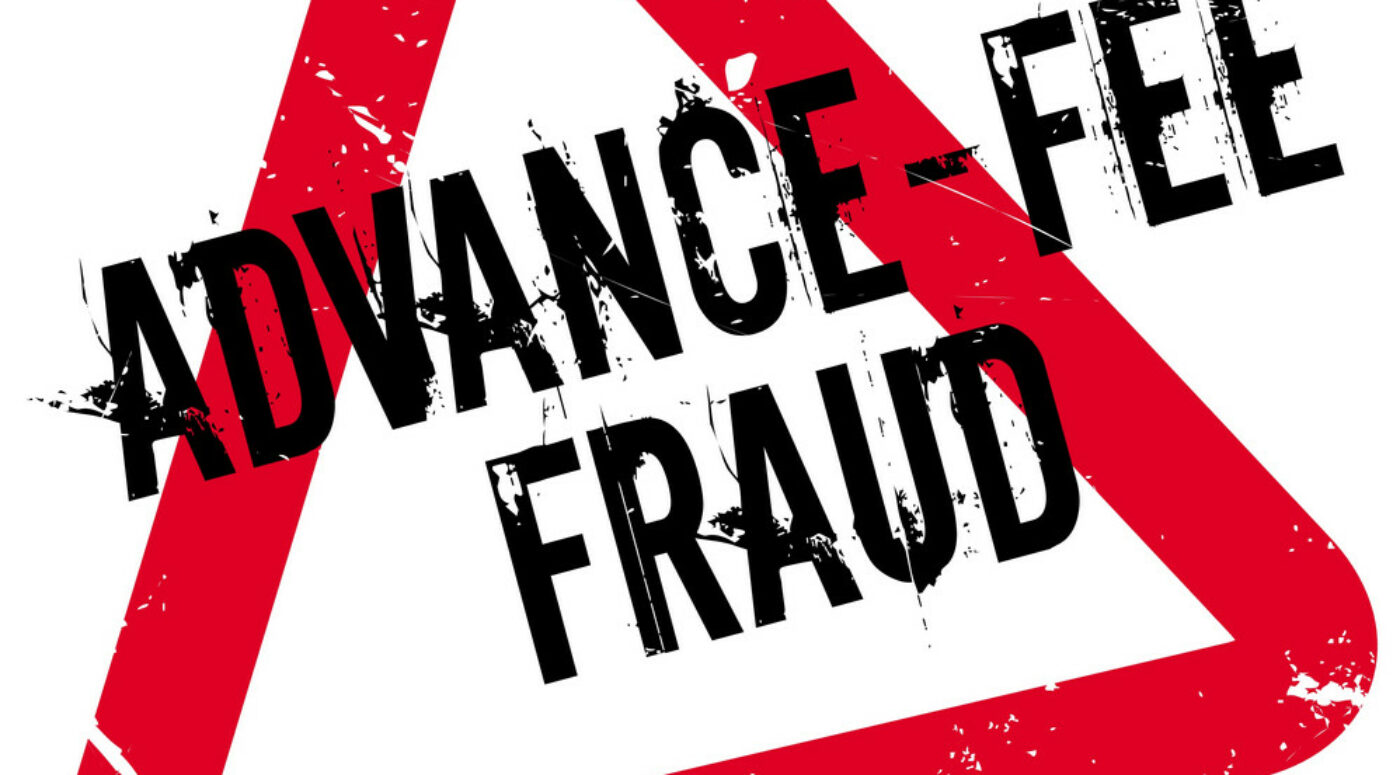

According to the latest data, advance fee fraud cases in the UK have been on the rise, making it all the more important to seek help from a qualified solicitor as soon as possible. If you find yourself arrested or charged with advance fee fraud, it’s natural to feel overwhelmed, but this article aims to provide you with some clarity and guidance. We address important questions such as “Do I need a solicitor for advance fee fraud?”, “What are possible defences for advance fee fraud?”, and “Will I get bail for advance fee fraud?” By understanding these key areas, you’ll be better prepared to navigate your way through the legal process.
Do I need a solicitor for advance fee fraud?
Advance fee fraud is a serious crime that involves a victim being deceived into paying money upfront with the promise of receiving something of greater value later, which never materialises. Examples of advance fee fraud include scams where victims are asked to pay fees for a loan, prize money, or investment opportunities that do not exist.
It is strongly advisable to seek the assistance of a criminal defence solicitor if you have been charged with any offence, let alone one as serious as advance fee fraud. This is why having a solicitor is crucial:
- Managing Complexity: Advance fee fraud cases often involve intricate details and evidence, including documents, email communications, and financial transactions. A solicitor can help interpret this information and build a solid defence strategy.
- Legal Expertise: A solicitor specialises in criminal law and understands the legal framework surrounding fraud. They can guide you through the legal process, ensuring you understand each step and your rights.
- Representation in Court: If your case goes to trial, having a solicitor represent you can make a significant difference. They will present your case effectively, cross-examine witnesses, and challenge the prosecution’s evidence.
- Mitigating Consequences: A solicitor can negotiate with the prosecution on your behalf, possibly reducing the severity of the charges or the penalties if a conviction is likely.
- Emotional Support: Facing criminal charges can be stressful and intimidating. A solicitor can provide not just legal advice but also emotional support, helping you manage the stress and confusion that comes with such cases.
What are possible defences for advance fee fraud?
One possible defence to advance fee fraud is lack of intent. For a charge to stick, the prosecution must prove beyond reasonable doubt that you intended to defraud the victim. If you can demonstrate that there was no intention to deceive and that you genuinely believed you could provide the service or goods, this could be a strong defence. Evidence to support this claim might include communications that show your good faith effort to deliver what was promised or financial records indicating attempts to fulfil the agreement.
Another defence is mistaken identity. This occurs when you assert that you were not the person who committed the fraud. Mistaken identity can happen due to various reasons, such as stolen identity or being falsely implicated. In such instances, alibi witnesses, surveillance footage, and other forms of evidence can help establish that you were not involved in the fraudulent activities.
Duress is also a possible defence. If you were forced into committing the fraud under threats of harm to yourself or your loved ones, you might be able to use this as a defence. To make a successful claim of duress, you need to provide compelling evidence showing that you were under immediate or imminent threat when the alleged fraud took place.
Will I get bail for advance fee fraud?
The seriousness of the offence plays a significant role in whether you will get bail. Advance fee fraud is considered a serious crime, particularly if significant sums of money have been defrauded. However, this does not automatically preclude the possibility of being granted bail. Courts will also look at the evidence presented by the prosecution and weigh this against the defendant’s circumstances.
Another key factor is the defendant’s criminal history. If the individual has prior convictions, especially for similar offences, the likelihood of being granted bail may decrease. A clean record, on the other hand, can be a favourable point in the defendant’s favour.
The court will also consider the risk of the defendant absconding. If there is substantial evidence to suggest that the person might not appear for their court dates, the chances of receiving bail diminish. Factors such as having a stable job, strong family ties, or community ties can help mitigate this concern.
Will I have to go to court if I’m arrested or charged for advance fee fraud?
If you are charged with advance fee fraud, the police will gather evidence and submit their findings to the CPS, who will then assess whether there is sufficient evidence to bring the case to trial. They will also determine if it is in the public interest to prosecute the case. If both criteria are met, you will likely be required to attend court.
Generally speaking, there are a few ways your case could do:
- You might be offered a caution if the offence is minor and you admit guilt. Accepting a caution means you won’t have to go to court, but it will result in a criminal record.
- For more serious cases, or if you deny the charges, you will likely be required to appear in court. Initially, you may be summoned to a magistrates’ court, where the seriousness of the case is assessed.
- If the case is deemed serious, it may be transferred to a Crown Court, where a judge and jury will hear the evidence and make a decision.
Will I go to jail if found guilty of advance fee fraud?
Several factors will play a role in determining whether you will go to jail if found guilty:
- Severity of the Fraud: The amount of money defrauded is a significant factor. Larger sums often result in harsher penalties.
- Number of Victims: More victims typically suggest a more elaborate scheme and can lead to a stiffer sentence.
- Role in the Operation: Were you the mastermind or just a minor participant? The court will take your level of involvement into account.
- Criminal Record: A history of previous convictions can negatively impact your sentencing.
- Mitigating Circumstances: Personal circumstances such as financial hardship or coercion to commit the crime might be considered.
Possible outcomes if convicted can range from a fine to a community order, or in serious cases, imprisonment. Sentencing guidelines for advance fee fraud provide a range of penalties but leave room for judicial discretion based on the case’s specifics.
Will I go to jail if it’s my first offence of advance fee fraud?
For first-time offenders, the court will likely consider the mitigating factors before determining the sentence. These factors might include your personal circumstances, whether you have shown remorse, and if you have cooperated with the investigation.
The court’s goal is to balance punishment with rehabilitation. For a first offence, there might be alternatives to a custodial sentence, such as:
- Community service
- Fines
- Probation
- Restitution to the victims
That said, this doesn’t mean a prison sentence is off the table. Advance fee fraud is taken seriously under the law, and depending on the severity of the crime and the judge’s discretion, a custodial sentence may still be imposed.
Can I get Legal Aid for advance fee fraud?
Legal aid is available for those who meet specific criteria. The eligibility for legal aid in criminal cases is assessed based on two main factors: the interests of justice and your financial situation.
- The interests of justice test evaluates the severity and implications of the case. Advance fee fraud, which involves obtaining money or other assets from victims under false pretences, is a serious offence. Due to its complex nature and potential consequences, such as imprisonment or significant fines, the interests of justice test is likely to be satisfied in many advance fee fraud cases.
- The financial means test examines your income and assets to determine if you are financially eligible for legal aid. This process includes evaluating your:
- Income from all sources, including wages, benefits, and pensions
- Savings and investments
- Property ownership
- Household expenses
- Any dependents you may have
Where to get more help
Facing criminal charges is, more often than not, an overwhelming and stressful experience, but you do not have to face it alone. Engaging a knowledgeable and experienced criminal defence solicitor can significantly impact the outcome of your case. Stuart Miller Solicitors are dedicated to providing expert legal guidance and representation to ensure your rights are protected. If you need assistance, get in touch today for a free no obligation consultation about your rights and options.
OUR COMMITMENTS TO YOU:
-
Responsive
A legal expert will consult you within 24 hours of making an enquiry.
-
Empathetic
We will always treat you with trust, understanding and respect.
-
Specialised
Your case will be handled by an expert who specialises in your type of offence.
-
Proactive
We will take early action to end proceedings as soon as it is practically and legally possible to do so.
-
Engaged
You will be kept updated on your case at all times. We will provide a named contact available to answer your questions.
-
Caring
We understand this is a difficult and stressful time for you and your family. Our team will support you every step of the way.
-
Tenacious
We will never give up on your case. We fight tirelessly to get you the best possible outcome.

